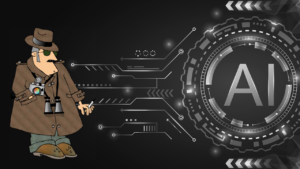Artificial intelligence (AI) is undoubtedly an overhyped buzzword. Michael Watson, an instructor at Northwestern University and a founding partner at Opex Analytics, explains, “‘AI’ is a tech buzzword that seems to take on a new meaning each time you hear it. This causes confusion for many business leaders who struggle to put it into perspective for their specific needs.”[1] To break through the confusion, Watson suggests business leaders view AI as an umbrella term encompassing a wide variety of algorithms and approaches. Rather than worry about what AI is, business leaders should concern themselves with what AI does. He concludes, “The most important realization to be aware of is that the definition of AI that suits your business may be entirely different for others.” That’s okay. “The bottom line,” he writes, “is that AI is behind many of the most influential transformations in business but exactly how it is applied in each instance is unique. The power behind AI is what you make of it.”
One thing business leaders can no longer afford to do is to ignore AI. Windy Garrett (@wgarrettatos), Vice President of Cloud Partners at Atos North America, notes, “The biggest advancements and overall game changers [in the business world] are artificial intelligence and machine learning (ML), which have the capability to transform businesses and industries so greatly that they can no longer afford for it to simply be aspirational. As we look further ahead to late-2019, 2020 and 2021, the need for AI/ML will be essential for businesses to stay competitive and will become the standard process companies will look towards to make intelligent decisions based on quantifiable data rather than traditional industry knowledge and executive instinct.”[2] Well-known technologist and investor Mark Cuban bluntly states, “AI is going to be … as important to companies as cash flow is. You have to be good at it or you won’t be able to compete.”[3]
AI is changing the business landscape
Most people realize AI is becoming more ubiquitous by the day. Few, if any, economic sectors will be immune to its influence. The list of industries being disrupted by AI is already large and growing. They include:
Entertainment. Think about the different entertainment outlets that recommend what books you should read, movies or television shows you should watch, or music to which you should listen. All these recommendations are being made by AI systems.
Agriculture. AI is being used to help farmers increase productivity by recommending crop rotations, soil enrichment, etc. In the years ahead, AI will help them harvest crops and monitor products as they move to market.
Call Centers. AI-powered chatbots are already having a major influence on customer support. This trend will only grow in the years ahead.
Customer Experience. Customer support and customer experience are related topics. Like algorithms used in the entertainment industry, AI-powered recommendation engines can help consumers find the right product at the right time.
Energy and Mining. Self-driving trucks are already being used in large mining operations. Cognitive technologies can also be used to smooth energy supply chains, monitor refineries, manage assets, ensure compliance with regulations, improve maintenance, and find new resources.
Healthcare. AI-powered systems are already helping doctors screen images, improve diagnoses and patient care, and identify high-risk patients. In the years ahead, most pundits believe AI will continue to have a significant impact in creating new drugs, predicting needed care, and establishing new treatment protocols.
Intellectual Property. With so much information available online, protecting intellectual property is a major challenge. AI systems can relentlessly scour the internet to discover issues relating intellectual property rights.
IT Service Management. Technology is changing more rapidly than any time in history. AI is helping organizations manage their networks, ensure compliance, and meet requests.
Manufacturing. Industry 4.0 will be built on a foundation of cognitive technologies helping to automate and optimize processes as well as helping develop new products. Many manufacturers are looking to create digital twins that can help them make better decisions about all aspects of their business.
Retail. Marketing is an essential part of the retail scene. The goal of every marketer is to get the right message to the right customer at the right time. AI can help. AI systems can also help with inventory control, logistics movement, and numerous other retail-related activities.
Software Development. With millions of lines of code required for many software systems, AI has the potential to improve how software is developed and tested.
Cybersecurity. Anyone who uses a computer knows malware, ransomware, and hacking are increasingly ominous part of life. AI can help detect and counter cyberattacks. For years, financial institutions have used AI to help them detect and deal with fraudulent activity.
Smart Cities. More people now live in urban areas than live in rural areas and cities are continuing to grow. Cognitive solutions can help every city system use resources more efficiently and help urban processes run more effectively.
Education. For years teachers have tried to provide individual attention to students. AI can help them in these efforts. AI systems can identify areas of need and help students learn at their own pace.
Supply chain management. AI systems can be used across supply chain networks from procurement to last mile delivery.
I’m certain there are other use cases I’ve missed; but, you get the point. AI platforms have broad application across most economic sectors. As a result, AI is changing the business landscape in significant ways.
Can AI help your business?
Technology journalist Daniel Dern writes, “Artificial intelligence in business is rapidly becoming a commonly-used competitive tool.”[4] The question remains: Is AI a good fit for your company? To answer that question Dern suggests finding out if your competitors are using AI and, if they are, how. Find out if any of your suppliers or customers are using AI and, if they are, for what purposes. He concludes, “Based on your research, you should be able to build a list and frame a sense of what AI can do for businesses in general, and for companies in your industry and of your size.” At some point, you’ll have to build an AI business case for your company. To do that, Dern suggests, you need to understand the various types of AI technology available, “like machine learning, deep learning, natural language processing, and cognitive computing.” More importantly, he notes, you need to understand what “each is good for [to] help you get a better grasp on AI, and understand the requirements and limits of various goals.” Eventually, you must identify “what specific tasks these capabilities can help with, such as smart agents (for phone, chatbots, and more), optimizing inventory orders, anticipating machine or system failures, identifying computer threats, spotting fraudulent customer activity. Based on this list, your next step is to come up with a short list of how artificial intelligence can help your business — specific tasks and use cases.” He adds, “To help make this list, decide what kinds of benefits you are looking for — improved employee productivity? faster workflow? improved product productivity? Reducing costs?”
Concluding thoughts
Industries (and companies within industries) that resist the introduction of AI systems will find, in the words of Star Trek’s Borg, “resistance is futile.” The Forbes Technology Council notes, “From streamlining operations to informing better decision making, it has become clear that this technology has the potential to truly revolutionize how the everyday world works. While AI and ML can be applied to nearly every sector, once the technology advances enough, there are many fields that are either reaping the benefits of AI right now or that soon will be.”[5]
Footnotes
[1] Michael Watson, “Why Business Leaders should think of AI as an Umbrella Term,” Supply Chain Digest, 8 August 2018.
[2] Windy Garrett, “Artificial Intelligence: No Longer a Business Want but a Need Instead,” Inside Big Data, 2 March 2019.
[3] Danielle Abril, “Mark Cuban: Invest in AI or Get Left Behind,” D Magazine, 26 September 2017.
[4] Daniel Dern, “Artificial Intelligence in Business: Using AI in Your Company,” Datamation, 8 February 2019.
[5] Forbes Technology Council, “13 Industries Soon To Be Revolutionized By Artificial Intelligence,” Forbes, 16 January 2019.





